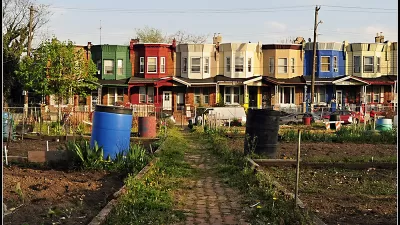Tips for community organizations looking to build relationships with local public health departments.

Health departments offer resources related to research capacity and data, and some fund community organizations directly. They can also act as conveners, providing connections to other government agencies or neutral ground for building alliances. There are plenty of examples of what health departments bring to partnerships to build community power and advance health equity. They can:
Conduct research and strategic planning to shift policy and framing—Working with health departments on research can provide powerful health analysis and framing for issues that your organization is working on. The Alameda County Public Health Department in California co-produced two major research projects with housing and racial justice organization Causa Justa::Just Cause that received extensive media coverage and helped drive policy changes. Rebuilding Neighborhoods, Restoring Health was one of the first reports in the country to discuss foreclosure as a health issue, while Development without Displacement focused on the health impacts of residential displacement and local policy responses. The research combined quantitative data collected by the health department with extensive focus group and interview data from people living in the neighborhoods most affected by foreclosure and displacement.
With their relationship solidified through these projects, the department continues to use its research capacity to provide objective health analysis in public testimony supporting stronger tenant protections. They’ve also changed internal practices: the department’s asthma program collaborated with code enforcement officers to identify landlords and hold them accountable for poor housing conditions that trigger asthma attacks, and “healthy home” visits now include questions about rent increases.
Use their regulatory authority—Departments have direct regulatory oversight over some issues, and community partnerships (and pressure!) can encourage them to use their authority creatively. The San Francisco Department of Public Health’s Environmental Health Branch partnered with the Chinese Progressive Association on a participatory research project about working conditions in Chinatown restaurants. The resulting report documented the prevalence of wage theft, and the Environmental Health Branch moved to incorporate compliance with labor standards into their restaurant health permitting process. One labor enforcement agency noted that restaurant owners were much more responsive to the threat of a suspended health permit than they were to labor violation fines.
In the context of COVID-19, public health departments have additional authority granted under emergency orders, and have an important responsibility not just to put it to use around issues like workplace safety, but also to ensure equitable enforcement.
They can also ...
FULL STORY: Forming Partnerships With Public Health Departments, Part 2: How to Make the Connection

Maui's Vacation Rental Debate Turns Ugly
Verbal attacks, misinformation campaigns and fistfights plague a high-stakes debate to convert thousands of vacation rentals into long-term housing.

Planetizen Federal Action Tracker
A weekly monitor of how Trump’s orders and actions are impacting planners and planning in America.

In Urban Planning, AI Prompting Could be the New Design Thinking
Creativity has long been key to great urban design. What if we see AI as our new creative partner?

King County Supportive Housing Program Offers Hope for Unhoused Residents
The county is taking a ‘Housing First’ approach that prioritizes getting people into housing, then offering wraparound supportive services.

Researchers Use AI to Get Clearer Picture of US Housing
Analysts are using artificial intelligence to supercharge their research by allowing them to comb through data faster. Though these AI tools can be error prone, they save time and housing researchers are optimistic about the future.

Making Shared Micromobility More Inclusive
Cities and shared mobility system operators can do more to include people with disabilities in planning and operations, per a new report.
Urban Design for Planners 1: Software Tools
This six-course series explores essential urban design concepts using open source software and equips planners with the tools they need to participate fully in the urban design process.
Planning for Universal Design
Learn the tools for implementing Universal Design in planning regulations.
planning NEXT
Appalachian Highlands Housing Partners
Mpact (founded as Rail~Volution)
City of Camden Redevelopment Agency
City of Astoria
City of Portland
City of Laramie




























